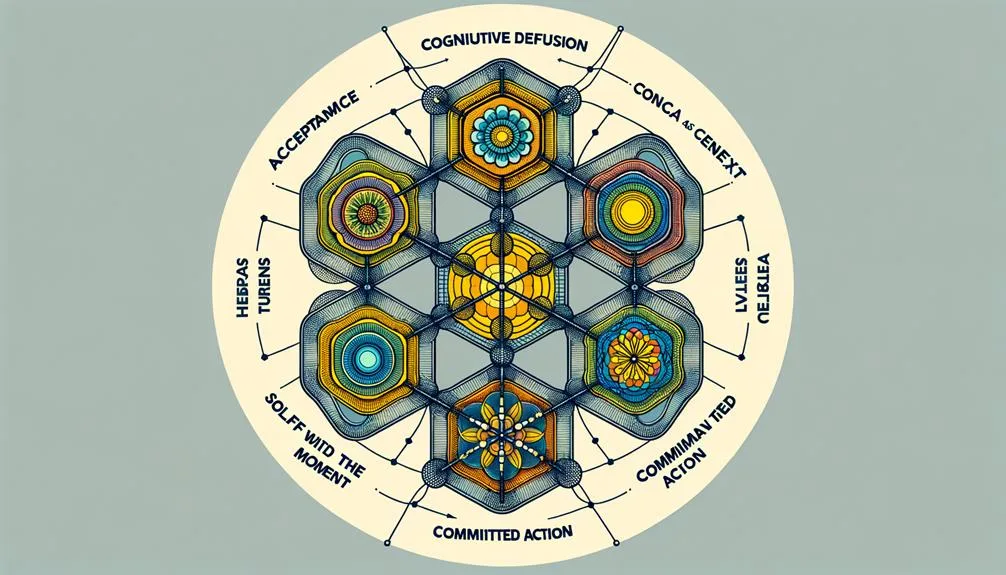Are you ready to unlock the key to psychological flexibility and tap into its transformative potential?
Prepare to be amazed as we dive into the world of Acceptance and Commitment Therapy (ACT) and explore the powerful tool known as the ACT Hexaflex model.
This comprehensive framework encompasses six essential components that, when utilized effectively, can guide individuals towards greater mental and emotional wellbeing.
But that's not all – we'll also be delving into the crucial role of mindfulness and its connection to ACT principles, offering practical exercises to help you cultivate present moment awareness and regain control.
Get ready to embark on a journey of self-discovery as we uncover the mysteries of psychological flexibility and the ACT Hexaflex model.
Key Takeaways
- The ACT hexaflex is a visual representation of ACT and consists of six core processes: acceptance, defusion, self-as-context, present moment, values, and committed action.
- ACT is a present-moment-focused therapy that helps restore a sense of control.
- ACT helps clients embrace their unwanted experiences and emphasizes the importance of values in guiding behavioral change.
- ACT emphasizes the role of language in treatment and helps clients develop self-kindness while shifting thinking from content to context.
The Hexaflex Model and ACT Principles
The Hexaflex model and principles of ACT provide a comprehensive framework for understanding and addressing client problems holistically.
One of the key aspects of ACT is the importance of psychological flexibility in therapy. Psychological flexibility refers to the ability to adapt and adjust one's thoughts, emotions, and behaviors in order to effectively navigate life's challenges.
Within the ACT model, there are six core processes that contribute to psychological flexibility: acceptance, defusion, self-as-context, present moment, values, and committed action. Understanding these core processes allows therapists to tailor interventions that target specific areas and promote meaningful change.
Present Moment and Mindfulness

As we shift our focus to the subtopic of 'Present Moment and Mindfulness', let's explore the significance of being fully present and cultivating mindfulness in the context of ACT therapy.
ACT is a present-moment-focused therapy that emphasizes the importance of connecting with the here and now. In our fast-paced lives, it can be challenging to slow down and truly be present. Ruminating about the past or worrying about the future can prevent us from fully experiencing the present moment.
Mindfulness exercises are integral to ACT and help build present moment awareness. These exercises, such as Leaves on a Stream meditation and thought watching, allow us to observe our thoughts and feelings without judgment.
Acceptance and Values

Embracing your unwanted thoughts and feelings is a crucial aspect of ACT therapy, allowing you to conserve energy and pave the way for meaningful behavioral change. Rather than struggling to suppress these experiences, ACT encourages you to accept them as they are, without judgment or attachment.
By embracing your experiences, you free up mental space and reduce the emotional energy spent on fighting against them. This acceptance creates an opportunity for you to live in alignment with your values, which serve as guiding principles for choosing actions that align with what truly matters to you.
Values provide a compass for navigating life, while goals are the steps you take to move closer to a meaningful existence. By embracing and living in alignment with your values, you can create a life that's rich, purposeful, and fulfilling.
Cognitive Defusion and Self-as-Context

When you engage in ACT therapy, you'll discover that it's not just about accepting and embracing your unwanted thoughts and feelings, but also about understanding how language plays a vital role in your treatment.
ACT emphasizes the role of language in treatment and helps alter how you use language internally. Many people lack self-kindness in their self-talk, constantly criticizing themselves and engaging in negative thought patterns. ACT aims to help you develop self-kindness and challenge unhelpful self-talk.
Shifting your perspective and challenging your self-talk are essential aspects of cognitive defusion and self-as-context in ACT. By shifting your perspective, you can detach from the content of your thoughts and recognize that they're just words, not necessarily reflecting reality. By challenging your self-talk, you can replace unhelpful thoughts with more positive and supportive ones, creating a healthier mindset.
This process allows you to create distance from your thoughts and not be defined by them.
Committed Action and Mindfulness in ACT

Committed action and mindfulness are fundamental components of ACT, providing you with the tools to live in alignment with your values and cultivate present moment awareness. These practices are essential for creating meaningful change in your life.
Here are four reasons why incorporating committed action and mindfulness into your ACT journey can have a profound impact:
- Mindfulness practices help you develop a deep connection to the present moment, allowing you to let go of unhelpful thoughts and focus on what truly matters.
- Taking action in alignment with your values empowers you to live a life that's authentic and meaningful, leading to a sense of fulfillment and satisfaction.
- Mindfulness exercises such as Leaves on a Stream meditation and thought watching can help you develop a greater sense of self-awareness and emotional regulation.
- By practicing committed action and mindfulness, you're actively investing in your well-being and personal growth, ultimately leading to a more fulfilling and purposeful life.
Frequently Asked Questions
What Are Some Common Challenges Clients Face When Trying to Stay in the Present Moment?
Staying present can be challenging for clients. Common obstacles include ruminating on the past or worrying about the future. Mindfulness exercises in ACT can help build present moment awareness and shift focus.
How Can Mindfulness Exercises Help Clients Build Present Moment Awareness?
Mindfulness exercises can help you build present moment awareness by focusing your attention on the here and now. This cultivates a sense of control and improves overall mental well-being.
What Is the Role of Values in Guiding Individuals Towards a Meaningful Life?
Values play a crucial role in guiding you towards a meaningful life. They act as directional arrows, helping you choose actions aligned with what truly matters to you. By living in alignment with your values, you can find purpose and fulfillment.
How Does ACT Help Clients Develop Self-Kindness and Challenge Unhelpful Self-Talk?
To develop self-kindness and challenge unhelpful self-talk, ACT encourages you to practice self-compassion and use positive affirmations. By embracing self-kindness and shifting your internal dialogue, you can cultivate a more supportive and empowering mindset.
How Does Committed Action Align With Living in Accordance With One's Values in Act?
Committed action in ACT aligns with living according to your values. It emphasizes consistency and persistence in behavioral change. By prioritizing values-aligned actions, you can create a more meaningful and fulfilling life.
Conclusion
As you conclude this journey of exploring psychological flexibility and the ACT Hexaflex model, you may find yourself inspired by the transformative potential that lies within.
By embracing the principles of acceptance, mindfulness, values, cognitive defusion, self-as-context, and committed action, you can unlock new levels of mental and emotional wellbeing.
Remember that the power to change and grow is within your grasp. With practice and dedication, you can cultivate psychological flexibility and embark on a path towards a more fulfilling and meaningful life.

